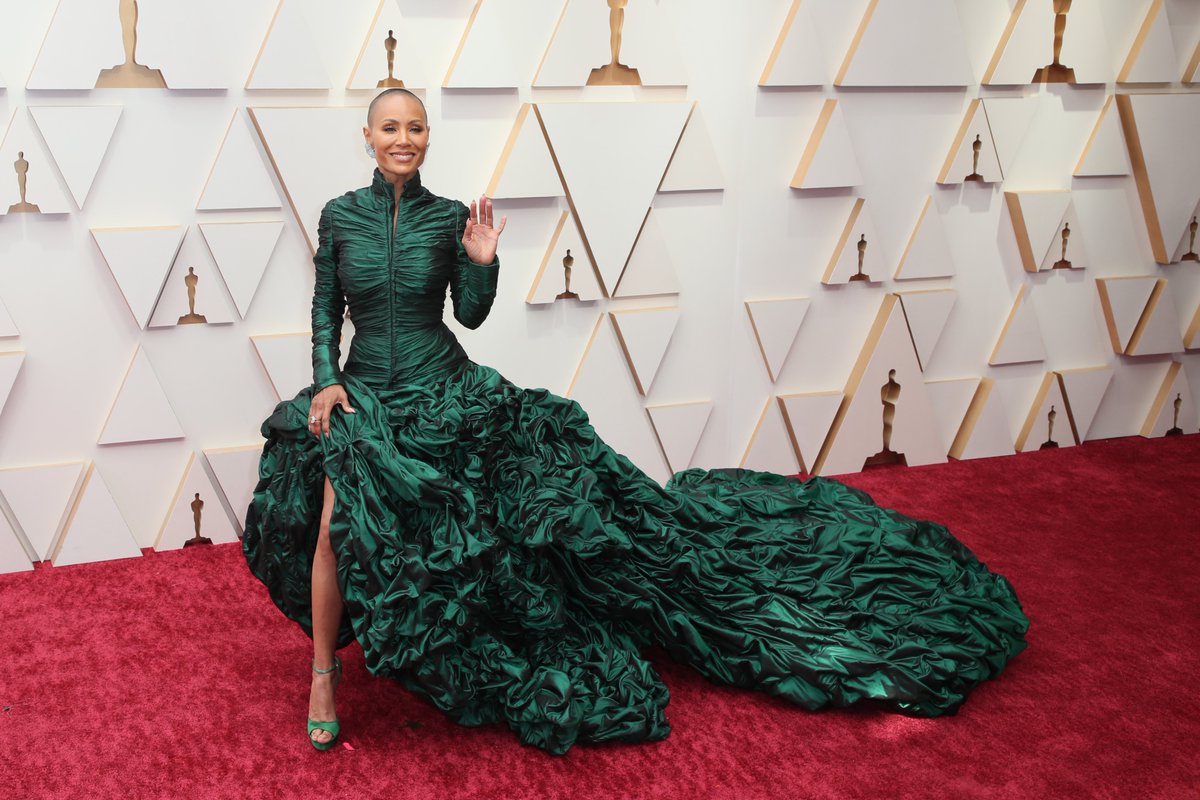Chris Rock’s Alopecia Joke Was My Worst Nightmare
For years, I’ve battled alopecia and attempted a variety of therapies with varied degrees of success, all the while sobbing more desperate tears over my hair than anything else.
Unfortunately, the most memorable scene from this year’s Academy Awards was when Will Smith stormed the stage and assaulted Chris Rock for making a joke about Jada Pinkett Smith’s hair. “Violence in all forms is harmful and destructive,” Smith acknowledged in a public apology to Rock. Many people were perplexed by the episode, although it had nothing to do with a haircut. Alopecia areata is an autoimmune disease that affects Jada Pinkett Smith. While ridiculing people’s appearances and bodies is always in terrible taste, and Rock may or may not have been aware of Smith’s condition, the way women’s hair loss is viewed in society is weird and gloomy.
While other celebrities have been known to suffer from hair loss, Jada Pinkett Smith stands out for her bravery in speaking honestly about her battle with the disease. She’s previously described it as “terrifying.” Her hairstyle (which, objectively, is stunning) is a result of an illness, rather than a conscious decision.
Alopecia areata is one of a group of autoimmune diseases that can affect both men and women of any age. The loss of patches of hair on the head is known as areata, and it is commonly linked to stress and hormonal changes in the body. Alopecia totalis (hair loss on the scalp) or, less commonly, alopecia universalis can emerge when the patches grow larger (the whole body). Other types of medical hair loss include androgenic alopecia, or age-related hair loss, which can begin as early as a patient’s early twenties.
While pricey supplements, shampoos, topical ointments like minoxidil, and internet-sold snake oil all claim to regenerate hair, they are virtually always useless. Steroid injections into the scalp (which, believe me, are pretty terrible) and oral steroids are both more effective solutions. At Columbia, Yale, and Mount Sinai, a novel class of JAK inhibitors (immune suppressing drugs) is now being studied in various phases. Dr. Emma Guttmann, the chief of dermatology at Mount Sinai, is now conducting a successful trial of the eczema medication Dupilimab. None of these new medicines are for the faint of heart: JAK inhibitors raise the risk of cancer and only have a brief effect. While safer, dupilimab is administered subcutaneously once a week. Then there’s the cost: because these medications are taken off-label to treat alopecia, they’re not covered by insurance.
This may appear to be a lot for hair. This is only “cosmetic,” as insurance companies cruelly contend when denying to cover cranial prosthetics—i.e. wigs—for alopecia sufferers. Who wants to put themselves at danger of cancer simply to regrow their hair? To tell you the truth, I did. For years, I’ve struggled with alopecia, and I’ve tried a variety of therapies with varied degrees of effectiveness. I’m struck by how alopecia affects me in ways that other medical conditions don’t. I’ve written about how I had a kidney transplant that left me “deformed,” in the words of one callous TSA agent, but I’m proud of my scars. It’s not the same with alopecia. I’m at ease with my situation now, but I’ve shed more desperate tears over my hair than I have over the life-threatening sickness that has rendered me prone to covid, left me in constant pain, ruled out the possibility of biological children, and will shorten my life. That’s a blunder.
You might think to yourself, “Wow, she’s pretty vain.” You may have a point in my instance, but I am not alone. Hair loss is a source of embarrassment for women in particular. Members of the hair loss community have been able to come together and share tales thanks to social media, and it’s evident that this is something that many people have been dealing with in secret for years. Bellamabella, an Instagram user, has spoken up about being forced “to feel less of a person” and being informed by prior partners that “no one wants a bald lady.” Others, such as sheeridanruth, believe that hair is “more than your appearance; it is your identity.” Many others express feelings of being unattractive, undesired, less of a woman, and unworthy of love. Women with hair loss avoid swimming and partaking in certain physical activities for fear of being “found out.” There’s a beautiful hair loss community out there, where champions like Lusta Hair’s Kim, Holly, and Georgia, as well as Australian writer Kellie (hairlossboss), share their stories, offer advise, and offer support to others. Even while celebrities such as Ayanna Pressley and Jada Pinkett Smith are honest about their sentiments and experiences, it is still difficult and isolated.
In my situation, I remained mute since, as Prof. Francesca Stavrakopoulou recently wrote in The Guardian, female academics are judged for their concern for their appearance. Many academic colleagues have felt compelled to comment on and critique my appearance in the past. At least one intelligent female professor, whom I’ve never met but who claims to be a feminist, has publicly chastised me for dying my hair and wearing it long. I only notified a few close friends when my hair fell out because I didn’t want to be criticized. I didn’t want anything to add to the inexcusable dissection of my body in a part of the world that is meant to be above it. Instead, I focused solely on hairlines and hair loss.
The situation is particularly challenging for African American women. “Damn near 49 percent of black women face alopecia at some point in their lives,” writes Nellcoleman on Instagram. The stigmatization of black hair, as well as the painful cosmetic procedures available to transform it into ostensibly “better” long straight hair, are part of fundamentally racialized gender ideals that affect all women, but especially black women. Much of this is covered in the Chris Rock-directed documentary Good Hair, which was released in 2009. When you consider that many treatments for tighter hair types can actually cause hair loss (a condition known as traction alopecia), Black women find themselves trapped in a painful cycle fueled by gendered and racial cultural politics. It is not my place to convey the story of Black women’s hair loss and social pressure, but I do know that things are worse for women of color.
The historian in me recognizes that women’s hair loss has a long history of stigmatization. For millennia, women’s hair has been associated with beauty. The idea that hair is connected with our identity dates back to the Romans, according to Molly Myerowitz Levine. Masculine and female baldness were not the same: male balding was associated with virility, while female baldness was associated with moral decay.
Ovid, the Roman poet, relates how his fiancée (probably Corinna) lost her hair due to antique curling irons in his Amores. He says angrily that he advised her to leave it alone and that now that she has destroyed her hair, she has no choice but to forget about her beauty. If she is a victim, it is just for the sake of appearances. The notion that a woman’s vanity is to blame for her predicament is prevalent. Women who drink, gorge themselves at meals, are sexually proactive, and otherwise behave like males “end up gout ridden and bald,” writes Seneca the Younger in one letter. It’s their own fault: when women participate in these “vices,” they “have forfeited the rights of their sex; they have scorned their womanly natures, and are thus forced to suffer from men’s maladies.” Even the Bible partakes in the fun: According to 1 Corinthians 11:15, a woman’s hair is her crowning glory. It is the same as having her hair shorn if a woman is so immodest as to expose her hair in public.
Nadini Pandey investigates the ways in which hair is a metaphor for both dominance and beauty in an amazing article published in the Classical Journal. “More than any other body component, hair obviously indicates gender, ethnicity, and even sexual availability,” she says. When the Germans were subjugated, they were known for shearing their hair, making it and shorn hair a symbol of their own defeat. While some have questioned whether this hair was part of the historical hair trade, wealthy women in ancient Rome could buy the prized blonde locks of the “barbarians” at wig shops. The ladies who engaged in this type of consumerism were also caught in a harmful cycle: blonde hair dye imported from Germany might cause hair loss, increasing demand for prosthesis. Ovid had some harsh words for these women as well, and Pandey adds that acquired hair was seen as dishonest. They were damned if they didn’t hide hair loss indicators and damned if they did. Even today, some women who wear wigs and toppers are concerned about being labeled as “catfish” and are unsure when to disclose their hair loss to a potential romantic partner.
This exemplifies an exploitative system that still exists today: human hair is a part of the body, and the human hair trade is frequently exploitative. The blonde hair that flooded the wig shops near the Temple of Hercules Musarum in ancient Rome was not contributed willingly. Similarly, most persons whose hair is used to build cranial prosthesis nowadays sell it to make ends meet, often for as little as $15. Hair is stolen in some cases, and much of it comes from temples where hair was donated as part of a religious ceremony. Those looking to acquire hair in the United States and Europe must conduct extensive research and pay a premium.
Many of the industries that benefit from hair loss, both ancient and modern, rely on desperation and secrecy. Because there is so much secrecy and solitude, the shame and stigma connected with hair loss linger. Hair density and length are prized by evolutionary biologists because they are related with youth and fertility, but let’s not exploit evolution to excuse ourselves. These are social norms that can be changed. What evidence do I have? Ironically, “wearing hair” has become acceptable for individuals who use “extensions.” These extensions are marketed and perceived differently from prostheses, despite the fact that they are made of the same hair. No celebrity is embarrassed or criticized if they admit to wearing extensions.
What happened to Jada Pinkett Smith is every woman’s greatest nightmare when it comes to hair loss. To be honest, I’m nervous simply writing this. Racialized and gendered beauty standards are at the root of the cultural conditions that keep women hiding (and spending). Let’s hope that this debate compels us to face the facts about how social beauty standards affect people.
Source: thedailybeast.com










